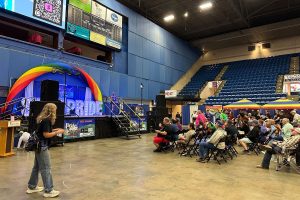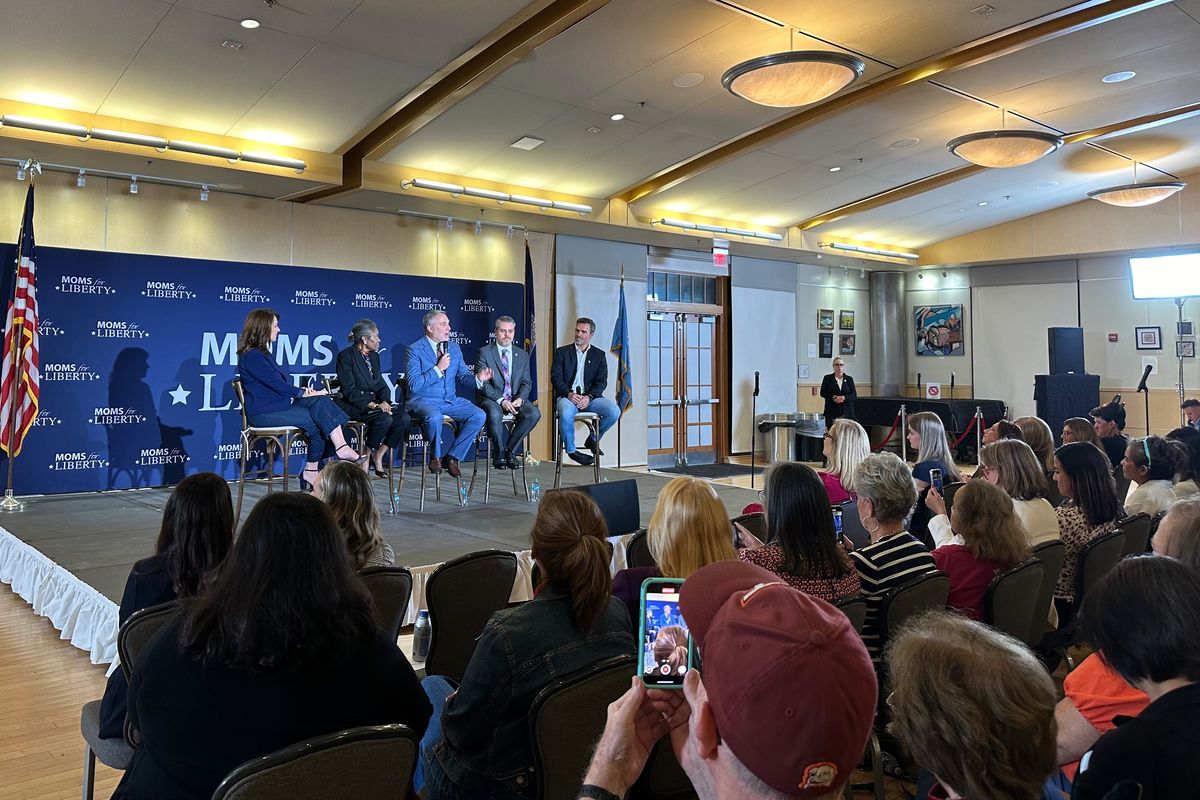SALEM, Va. (AP) — René Harvey and her wife arrived at a Roanoke Valley pride celebration in October carrying deep-seated worries about all that could go wrong.
The couple had been to the region’s annual pride festival before, but this year felt different. Harvey keeps up with the news, and the headlines describing political violence and LGBTQ+ hate linger with her. She’s been following Virginia’s statewide elections, including a race for governor that has heavily focused on trans youth.
“It’s scary, the way things are heading,” said Harvey, sitting at a booth for her LGBTQ-friendly parish. “We had a fear coming here today.”
It turns out Harvey had nothing to worry about. The festival was peaceful, even celebratory. Her interactions with residents in the area were friendly. Festival-goers from all over Virginia weren’t dwelling on gender identity and how it’s handled in the public schools.
But the topic matters to Winsome Earle-Sears, the Republican nominee for governor, who has said in her campaign that trans girls should be banned from bathrooms and sports teams. Abigail Spanberger, the Democratic nominee, has largely avoided the subject, saying only that statewide political leaders should not be meddling in local school matters.
Southwest Virginia Pride’s festival took place on the edge of Appalachia, in a city where President Donald Trump defeated Vice President Kamala Harris by more than 19 percentage points, and Republican nominee Hung Cao beat U.S. Sen. Tim Kaine by 13 points in his unsuccessful campaign. Spanberger, who has worked to make inroads with rural Virginians, and Earle-Sears have both made appearances west of the city.
The winner of the governor’s race will likely have a lot to say about regulations over trans youth in schools. In October, term-limited Republican Gov. Glenn Youngkin issued an executive order urging the Virginia Board of Health to draft guidance to “protect women’s and girls’ health and safety,” and he has also supported similar legislation in the Democratic-led legislature, which failed.
Harvey can appreciate nuance on the matter. She used to work in schools and said she believed kids deserve equal opportunities to succeed, particularly in sports. But she worries about the safety of her queer and trans neighbors, gathering in a vibrantly decorated sports complex to celebrate in a moment when their identities have been pushed to the political forefront.
Instead of carrying fear, she may join the next pride event, carrying a concealed handgun if it’s legally allowed at a future celebration.
“Just for peace of mind,” she said.
Ads surge in the Roanoke Valley
Trans youth in schools has been a key debate across Virginia heading into statewide elections, and the Roanoke Valley is no different. Earle-Sears has spent about $1 million and Spanberger around $409,000 on ads in the Roanoke media market addressing the matter, according to data from the nonpartisan media tracking firm AdImpact.
One of the top commercials from Earle-Sears’ campaign airing in the region attacks Spanberger for voting “to let boys share locker rooms with little girls” and “let children change genders without telling their parents,” according to AdImpact.
An ad put out by Spanberger counters that she wants to “get politics out of our schools and trust parents and local communities.”
The ads mirror the battle lines of their recent debate, in which Earle-Sears described trans students as a safety threat, and Spanberger declined to say whether she would rescind the measure signed by Youngkin requiring students to go only to the restrooms of their birth gender.
Jacey Clay, a trans woman on that board that organized the pride celebration, said the way trans people had been described in the governor’s race felt divorced from her reality. She made her transition two years ago, and said her people looked out for her and did not shame her.
“I have never once had a bad experience in the real world with people in Patrick County,” Clay said of her home in southwest Virginia. “I only see this fear of trans people in online spaces.”
Clay’s custom is to ignore the ads and Reddit chatrooms. In her Appalachia, she said, where she goes to the bathroom doesn’t come up in conversation.
Dolly Davis, a trans woman from Roanoke County, waved and hugged dozens who crossed her path at the pride event. “Our community is a close one,” she said. But she also acknowledged that “the talk from kowtowing politicians” is sometimes hard to ignore.
“We’re hiring them to work for us,” Davis said of trans voters. “But on the job, they tell these political lies going after us.”
Concerns linger in Fairfax
About half of Virginia voters in the 2024 presidential election said support for transgender rights in government and society had “gone too far,” according to the AP VoteCast survey of voters. That measure was roughly in line with voters nationally. Only about one-quarter of Virginia voters said that support had “not gone far enough” and about the same share said it was about right.
Transgender rights were an issue that President Donald Trump hammered in attack ads last year ahead of his victory over Harris, most notably with a punchline: “Kamala is for they/them; President Trump is for you.”
It’s been a year since Trump’s anti-trans campaign. But the conversation has continued in Fairfax city, a deep blue community roughly 225 miles (362 kilometers) from Salem, Va., where Harris beat Trump by more than 34 points.
It’s there where parents, students, teachers and others gathered at a Moms for Liberty town hall earlier this month, and a panel of parents bemoaned local school board policies that considered the rights of trans kids.
One of the parents, Chris Funderburg of Prince William County, said, “There is a transgender student at the school, and my daughters don’t want to use the bathroom at the school.” Another parent described her high school son as “completely mortified” when he had to change clothes in front of a trans girl in the locker room.
Earle-Sears and Republican John Reid, the nominee for lieutenant governor, also spoke at the event of their pledges to weigh into the cultural matter if elected in November. At one point, Reid, who is openly gay, said to a cheering crowd. “You are not a bigot for saying that boys belong in one restroom and one locker room, and girls belong in another.”
Reid’s view contrasts with Sarah Goodman, a former Roanoke-area public high school English teacher who attended the pride festival. She said she left her position partly because she felt politicians were forcing too much anti-LBGTQ politics onto teachers.
Standing near rainbow-colored booths next to a live performer belting songs by Chappell Roan, Goodman said, “This is about bigoted adults.”
___
Associated Press writers Maya Sweedler and Linley Sanders in Washington contributed to this report.
___
The Associated Press’ women in the workforce and state government coverage receives financial support from Pivotal Ventures. The AP is solely responsible for all content. Find the AP’s standards for working with philanthropies, a list of supporters and funded coverage areas at AP.org.
By OLIVIA DIAZ
Associated Press/Report for America


